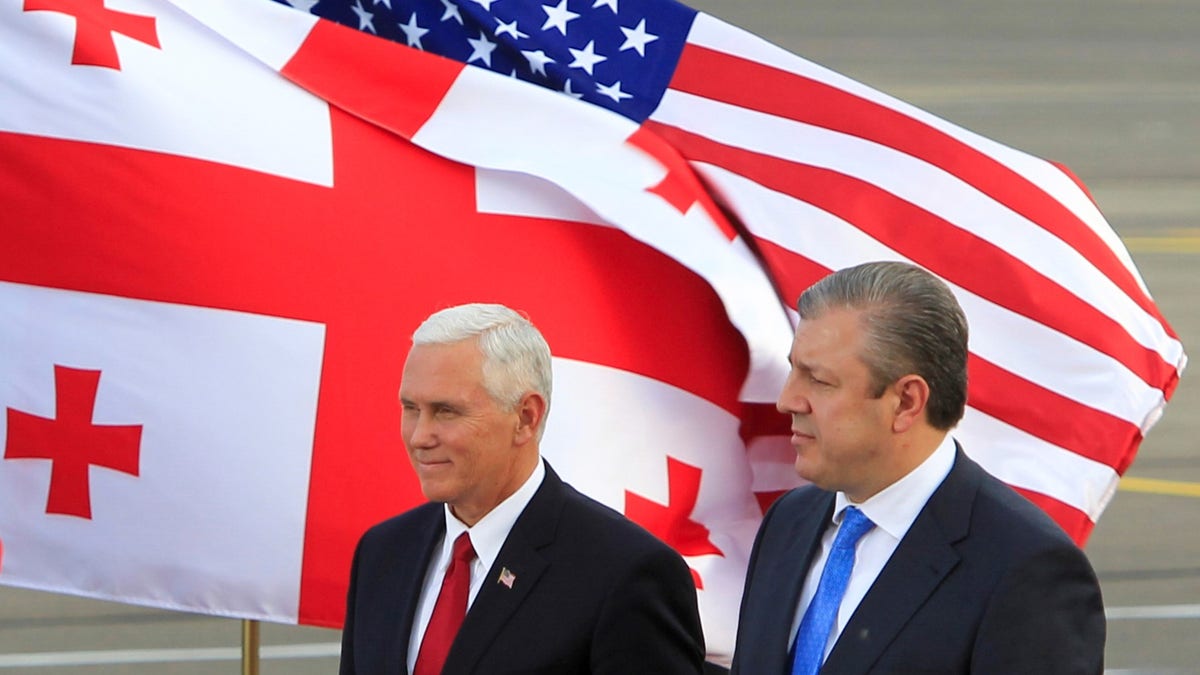
FILE -- Vice President Mike Pence and Georgian Prime Minister Georgi Kvirikashvili attend a welcoming ceremony at the Tbilisi International Airport, Georgia July 31, 2017. (REUTERS/Shakh Aivazov/Pool)
Countries around the world are seeking to steadily strengthen the essential pillars of national success: security and trade. In my country of Georgia, security and trade directly and substantially impact American national interests. My discussions with Trump administration officials and lawmakers in Washington this week are focused on advancing our shared interests in these two critical areas.
One hundred years ago this month, Georgia recovered its independent statehood, which dates back two millennia and is marked by constant struggle for freedom. The short-lived First Democratic Republic of Georgia was soon annexed by Soviet Russia and we endured 70 years of occupation and foreign dominance.
Georgia is widely recognized today as an emerging hub for culture and commerce, a new “must see” destination on the global tourism map, and a democracy with thriving civil and public institutions.
This road was impossible to travel without the support of the United States, which was among the first to recognize our independence. America has remained a loyal friend throughout recent decades – including the most recent decade, since Russia’s 2008 invasion and continued occupation of 20 percent of our territory.
As part of the West, Georgia embraced its security responsibility by fighting shoulder-to-shoulder with the U.S. armed forces in places like Iraq and Afghanistan, where our shared values are threatened. In fact, we are one of the largest per capita troop contributors to the international mission in Afghanistan.
Georgia – a country aspiring to NATO membership – already exceeds the alliance requirements for defense and technology spending.
Trade between our nations now requires urgent attention because the opportunities are so appealing and their likely results so far-reaching. Smart trade, beginning with a strong U.S.-Georgia bilateral agreement, should be on our agenda.
Georgia, which is ranked among world’s top 10 countries in the Word Bank’s Doing Business 2018 index, is an ideal gateway for U.S. businesses to enter Eurasia’s burgeoning marketplace. It provides an advantageous position at the crossroads of the region’s new trade routes and relationships.
A U.S.-Georgia free trade agreement would be good for more than our respective bottom lines. An agreement would benefit America’s strategic interests in Eurasia and the security of both countries in at least three critical ways.
First, such an agreement would give American companies a foothold in Eurasia and a gateway to the New Silk Road and its Europe-to-Asia market of more than 2 billion people. Georgia is fast becoming a primary overland route between China and Europe.
Shoring up U.S. investment in Georgia will ensure that American companies can capitalize on the New Silk Road from the home base of a reliable ally, which already enjoys free trade arrangements with China, European Union, former Soviet republics and Turkey.
Second, a trade agreement between the United States and Georgia would add new opportunities to the energy sector. Strategically located between Iran, Turkey and Russia, Georgia is the only alternative energy supply route between the Caspian basin and Europe.
In addition to giving the U.S. a path for engaging in this growing market, a trade agreement would create a gateway for American exports to reach the eight landlocked countries in the immediate vicinity, totaling a market of more than 120 million potential customers and $400 billion of economic activity.
Finally, a bilateral trade agreement would create American jobs. Georgia has awarded the contracts to develop and operate Anaklia – a large, game-changing deep-sea port on the eastern shore of the Black Sea – to leading American companies.
The planning, construction and operation of this port (and other related infrastructure projects) will have an overall budget of $2 billion. It will create jobs for Americans, while building confidence among maritime users. A trade agreement would build wealth, create jobs and further develop value chains for American companies active in Georgia and the region.
Georgia’s remarkable economic growth continues, and its attractive, pro-growth business environment beckons. A U.S.-Georgia trade agreement would advance America’s strategic and economic interests, while helping Georgia to sink ever deeper roots in the West’s free market economy and security architecture.
Georgia remains a bright spot at the epicenter of Eurasia’s new economic paradigm, providing U.S. policymakers and trade representatives with a ready, willing and able friend in an increasingly consequential part of the world.
